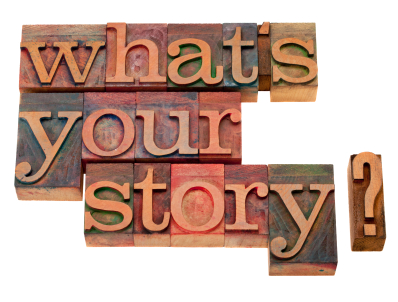How Telling the Right Story can take your Marketing from Blah to Bazinga!
Stories are the vehicles that turn information into meaning; they are the emotional connection between you and your audience. Stories turn a faceless corporation into a community of people with goals and dreams and intentions. Stories are more likely to be shared on social media or by word of mouth. Your audience will happily spend time with your story, but only seconds with your product.
Stories weave the very fabric of our lives. They provide context, give our actions purpose and our lives meaning. For all our texting and chatting and Facebooking, we’ve lost the art of telling our stories. That doesn’t mean that there aren’t stories anymore; they’re all around us, but what’s missing is the personal interaction. We haven’t lost our desire to hear stories or the desire for personal interaction; we’ve just started looking for it in some pretty strange places…
Pacman, Pina Coladas and Reality TV.
When we were kids, arcade games consisted of rotating a small triangle to destroy meteorites or negotiating a little yellow circle through a maze. I had no idea what Pacman was or where he came from. There was Miss Pacman, but were they in love? Did they like to watch old movies, drink piña coladas and take long walks on the beach? Back then, we didn’t need a context to the game, we just liked the functionality.
Modern games have to come with complex backstories as each tortured character frames his need for revenge against the backdrop of a slaughtered family or where an unlikely hero has to save the world from North Korean alien terrorists.
Reality TV is another way in which we get to hear stories. Whether you’re watching the Real Housewives of Vancouver or Choppers of Orange County, more and more of our TV is infused with tensions, drama and behind-the-scenes glimpses at the relationships between the characters rather than the subject at hand.
Here’s a great TED Talk by Andrew Stanton (Toy Story, Finding Nemo, Wall-E) on Storytelling
The importance of Storytelling in your Marketing Strategy
This yearning for stories and human connection permeates everything we do, especially where we choose to spend our money. As consumers get bombarded with more advertising every day, it’s the company that provides a rich context that stands out.
Every post, tweet and blog forms part of your story. Don’t think I can tell a part of your story in 140 characters? Challenge accepted!
Take a look at these snippets from onesentence.org:
- My happiness at her saying she missed my dog was short lived when she said she got him with the next shot.
- Christmas will be hard this year with two girlfriends.
- It was in the middle of my Bombay chicken that my stomach made a sound like Pacman dying.
- Psychics can see the color of time; it’s blue.
- I grabbed my brother’s leg from underneath an adjacent toilet cubicle and he ran out screaming.
Social media matters and, when used effectively, these little pens can have be mightier than your entire marketing budget sword combined.
Let’s use Debra Sterling as an example. Debra decided to make a toy. Not just any toy, but a construction toy for girls. People told her it couldn’t be done, that she couldn’t compete with Lincoln Logs and Lego and nature itself since construction toys are (clearly) for boys. But Debra had a secret weapon; her research had shown that girls need a story to get them to engage, so she created a toy replete with building blocks, characters and a story book that tied it all together. Instead of selling the product, she decided to tell her story: “I didn’t just want to be another brand. I’m a real person and an Engineering graduate from Stanford. I wanted to create a toy that encouraged little girls to think of engineering as an option,” says Sterling. Now she wasn’t just another faceless company; she was a brilliant young entrepreneur trying to right a wrong in society and give little girls an opportunity that they had never had before. Debra shot a video of herself telling the story of how her toy was created to broaden the minds of little girls and fulfill dreams they never even knew they had. Her story was so appealing that the video went viral and her online store is doing a booming business.
Brand-weary consumers are thirsty for stories, for contexts, for emotional connections to real people. Who is telling your story? If its Doug from IT or your intern, then pinch yourself; you need to wake up! Every Facebook status update, every tweet, every newsletter and blog post is a vital part of your unique story. If you aren’t going to take your story seriously (no offence, Doug) then it’s not going to take you seriously either. While it is possible that a hundred monkeys with typewriters may eventually produce the works of Shakespeare, it’s highly unlikely. Hire a professional and get a real story with real characters (that’s you!) and a plot that engages your audience.









